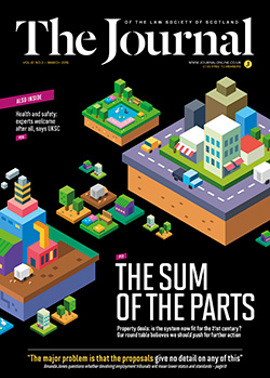Making safety work

On 18 December 2010, Tracey Kennedy, a home carer employed by Cordia (Services) LLP, suffered a serious wrist injury when she slipped on an icy path on her way to the home of a terminally ill client. The path, the only route available, had not been gritted. She sought damages from her employers.
Lord McEwan at first instance ([2013] CSOH 130) described Kennedy as being on an “errand of mercy”, and accepted her evidence that phoning her employer with a view to cancelling the visit was not an option. Had she not been at work, she would not have ventured out in those conditions. Her employer provided some clothing, but no footwear or guidance on appropriate footwear. Information recovered under freedom of information revealed that in the preceding years a number of home carers had slipped on ice to their injury. Various other employers, including local authorities and Royal Mail, provided employees with over-shoe attachments for icy conditions.
Alternating success
The case against Cordia was based on breach of common law and statutory duties. Under the Personal Protective Equipment at Work Regulations 1992, Cordia had a duty to ensure that suitable personal protective equipment (PPE) was provided to employees if it could not control the risk of slipping on ice by other equally or more effective means. In addition, the Management of Health and Safety at Work Regulations 1999 require an employer to make a suitable and sufficient assessment of risks to health and safety of its employees. Cordia claimed it had carried out risk assessments and provided training.
Lord McEwan upheld both the common law and statutory cases, finding that neither of Cordia’s risk assessments were “suitable and sufficient”, and evidence about training and enforcement was unsatisfactory. There had been no attempt to consider PPE for footwear; that in itself showed that any precautions Cordia thought it was taking could never amount to “adequate control by other means which are equally or more effective”.
This decision was reversed by an Extra Division: [2014] CSIH 76. The court drew a distinction under the regulations between “work related risks” and “other risks to which a worker may be exposed”. The risk of slipping on ice or snow was an ordinary risk encountered by members of the public, and not a risk at work that engaged reg 4 of the PPE Regulations. Even if it were, it was controlled by other means that were equally or more effective than over-shoe attachments. Holding otherwise would mean that “employers would be required to take responsibility for the way in which employees conduct themselves to an extent which would not only be impracticable and irrational but would also constitute an unwarranted intrusion into the private lives of competent adults who within the sphere of day-to-day living are likely to be better placed to make judgments as to what will be conducive to their health and safety than their employers will be”. Further, the Management Regulations had not been breached and there was no direct cause of injury.
At common law, the court believed the Lord Ordinary had failed to have regard to Morton v William Dixon Ltd 1909 SC 807, which requires that for an allegedly negligent fault of omission, it is necessary to show that the thing omitted was commonly done by other persons in similar circumstances, or was so obviously required that it would be folly not to have done it.
Safety levels
The Supreme Court (Lady Hale and Lords Wilson, Reed, Toulson and Hodge: [2016] UKSC 6) unanimously allowed Kennedy’s appeal. Following the removal in October 2013 of civil liability for breach of work-related regulations, the decision provides valuable guidance for practitioners in assessing the nature and extent of an employer’s common law duty of care. In particular, the court made clear that statutory duties remain relevant in informing that common law duty:
“The expansion of the statutory duties imposed on employers in the field of health and safety has given rise to a body of knowledge and experience in this field, which, as we explain later in this judgment, creates the context in which the court has to assess an employer’s performance of its common law duty of care” (para 64).
The influence of European regulation over the last 25 years has changed the climate of workplace health and safety in this country. The court approved the Lord Ordinary’s statement that the direction of the law was to level safety upwards (para 76). The Enterprise and Regulatory Reform Act 2013 has not negated the advances made during this period.
It also stressed the fundamental importance of risk assessment as a “blueprint for action”: Allison v London Underground Ltd [2008] EWCA Civ 71, and the most logical way to approach a question as to the adequacy of an employer’s precautions. In the present case the risk of slipping while travelling between clients was obvious. It could not be avoided, and therefore had to be evaluated and addressed. Injuries were potentially serious. Cordia had given no consideration to the possibility of PPE before relying on the measure of last resort, giving appropriate instructions to employees. Even then, the advice given did not indicate what footwear might be appropriate. The Lord Ordinary was entitled to conclude that there had been a breach of reg 3(1) of the Management Regulations.
Different from the public
The Supreme Court rejected the Division’s view that the regulations did not concern risks to which a worker might be exposed in the same way as members of the public. An employee was “at work” for the purposes of both regulations throughout the time when they were in the course of their employment. Further, “while at work” in the PPE Regulations, and “whilst they are at work” in the Management Regulations, plainly referred to the time of exposure to risk, not the cause of the risk.
In relation to causation, the Supreme Court noted the evidence established that anti-slip attachments reduced the risk of slipping in wintry conditions, and therefore if Kennedy had worn them the risk of her falling would likely have been reduced and perhaps eliminated. Focusing on the PPE Regulations, the equipment need not necessarily prevent the risk but must, as a minimum, adequately control the risk so far as reasonably practicable. Where an employee is injured as a result of a risk against which they should have been protected by PPE, and where it is established they would have used the PPE, it would normally be reasonable to infer that the failure to provide PPE caused or made a material contribution to the injury.
The court rejected the Inner House’s concern that the law might become overly paternalistic. Kennedy’s livelihood depended on her going out in wintry conditions, to provide essential care, at specific places, on untreated routes and at times over which she had no control; she was not in the same position as other members of the public.
The common law had evolved such that risk assessment now formed the context in which an employer had to exercise reasonable care for its employees. Precautions were not confined to the test in Morton v Dixon; a negligent omission could result from a failure to seek out knowledge of risks which were not in themselves obvious. It was not appropriate for the Inner House to apply the “fair, just and reasonable” test in Caparo Industries v Dickman [1990] 2 AC 605: here the question was not whether a duty of care existed, but whether it was fulfilled. The Lord Ordinary was entitled to conclude that Cordia was negligent at common law in failing to provide Kennedy with attachments. (Causation at common law was not established because he did not explicitly consider the matter.)
Admitting the expert
Since the Inner House’s decision, there has existed a great deal of confusion on the issue of expert witnesses. The Division was critical of what it viewed as the increasingly widespread practice of producing “expert” reports which did not exhibit any expert quality, and suggested that “health and safety” as an area of expertise should not be recognised at all. The Supreme Court rejected that and confirmed that health and safety can properly be regarded as a recognised body of science or experience on which expert evidence can be led.
In arriving at a decision as to whether evidence should be admitted as expert, the court set out four governing principles: (1) whether the proposed skilled evidence will assist the court in its task; (2) whether the witness has the necessary knowledge and expertise; (3) whether the witness is impartial in their presentation and assessment of the evidence; and (4) whether there is a reliable body of knowledge or experience to underpin their evidence. With regard to the pursuer’s expert, Mr Greasley, it was reasonable for him to express an opinion as to what he would have done in the circumstances. He had experience of risk assessments and was able to assist the Lord Ordinary by providing information on a British standard that he might not be familiar with. Without such evidence the court had difficulty envisaging how Kennedy could have presented her case. The Inner House was wrong to suggest that by accepting Mr Greasley’s evidence, the Lord Ordinary had abdicated his role as decision-maker.
Significant ruling
Without doubt, this case will play an important part in shaping the law governing an employer’s duties to its employees. A responsible employer will give careful thought to the risks to which employees are exposed and take reasonable steps to protect them from coming to harm. The standards of good practice, driven by the body of European directives over the last 25 years or so, remain relevant. Whether over-shoe grips will become an everyday sight on our streets in the winter remains to be seen. Maybe there really is no such thing as bad weather… just inappropriate clothing.
In this issue
- Divorce in Scots law and Sharia law
- British Bill of Rights: radical reform or damp squib?
- Ten steps to winning new business
- The Keeper is coming
- Winding-up applications: when to refuse a first order
- Reading for pleasure
- Opinion: Marsha Scott
- Book reviews
- Profile: Susan Carter
- President's column
- Securities: no more sasine
- People on the move
- Back for more
- Funding your practice
- Equal but different?
- Making safety work
- A mediation story: the mediator's log
- Uber and above?
- Experts reassessed
- Land reform: part 10 takes shape
- Out of shape
- Requirement to register: meet PSC and SIOC
- Transgender: developing participation rules
- Scottish Solicitors Discipline Tribunal
- The road less travelled
- From the Brussels office
- Law reform roundup
- Doing the business
- EU benefit rights: a not so new deal?
- Fraud: raising your game
- Ask Ash
- In the rights place
- Using your secure digital signature
- Come to the conference






